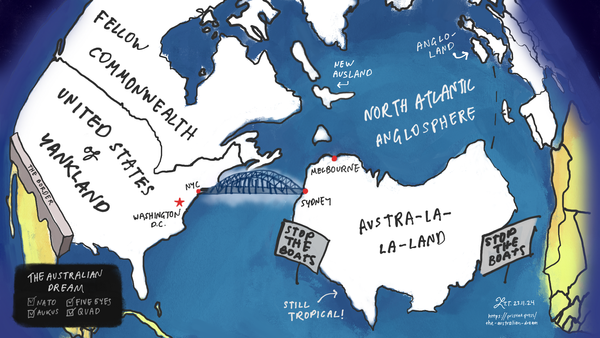Australia: Dysfunctional House of Cards
Introduction
I have a simple impulse right now to write an entire book. So the tag here will be used on posts that could be compiled as a book with the above working title.
In Discourse sur le Colonialism, the poet Aimé Césaire writes this:
Europe is morally indefensible. And today the indictment is brought against it on a world scale, by tens and tens of millions of men, who, from the depths of slavery, set themselves up as judges.
[…] and we must show that each time a head is cut off or an eye put out in Viet Nam and in Europe they accept, each time a little girl is raped and in Europe they accept, each time a Madagascan is tortured and in Europe they accept, a poison has been instilled into the veins of Europe, and slowly but surely, the continent proceeds towards savagery.
Australia is also morally indefensible. I have thus also set myself up as judge from the depths of Australian society, and I am going to write about the poison in the veins of Australian society, and how the continent has truly fared after wading in the depths of savagery.
Like an optometrist carefully tweaking and swapping out lenses for a patient until she finally finds the right pair which correctly match the predispositions of the eyes of the beholder so that he may then see accurately, I have tried multiple lenses over the past decade to try and finally get an accurate picture of Australian society by accounting for the biases that underlie the eyes of the country's citizens.
In the past decade and beyond, I have been through Catholic, government and private schools; I have been through youth homelessness services and the rental system; I have been through the low calibre public youth mental health systems and psychological therapy under a very experienced clinical psychologist.
The thing that would amaze me and depress me was how utterly apathetic everyone is when I would first describe the mass failings and entrenched elitism of the Australian school system, after quitting deliberately since I didn't want to be a part of perpetuating that.
I described the whole thing to someone who was important to me, and he understood the entire thing, underscoring to me that it was not about education or overcoming class level but just entrenching elitism. But at the end he said to me as an offhand comment, "well, what can you do about it?" My vague hope that never really came true was that I'd at least run into people who were as upset about seeing this as I was, and maybe would want to overthrow the whole system instead of soaking in it for their own success, or participating but turning a blind eye to it.
But I realise now that he and others like him (otherwise participants benefiting from the ways things are) are paying the price for that. For the "St. Grammars of the nation", as another highly-appreciated acquaintance of mine likes to put it, produce the low calibre politicians who believe they have the right to rule, who bring in all the dumb and self-serving policies that make it impossible for his generation to buy a house, that funnel hundreds of billions of their working dollars into supporting the US military-industrial complex ($368 billion for submarines), that prey upon the poor (Centrelink Robodebt), that make it increasingly impossible to access decent healthcare and simple dental care, and other stuff like that.
Similarly I noticed that no one is too fussed about many industries being dominated by three to four companies which hold monopolies / duopolies. And now they are paying the price for it through price gouging dressed up as inflation.
As was written in The Monthly:
The problem isn’t just at the pump. One standard measure of market concentration judges an industry to be concentrated if the top four players control more than one third of the market. In 2016, we calculated this measure for 481 Australian industries and found that more than half of Australia’s industries are concentrated.
Some sectors are particularly tightly controlled. In department stores, newspapers, banking, health insurance, supermarkets, domestic airlines, internet service providers, baby food and beer, the biggest four firms comprise more than 80% of the market. In fact, it’s hard to come up with examples of Australian industries that are not dominated by a few behemoths.
And as someone wrote on Sydney Morning Herald via Pearls and Irritations:
But what never happens is that the level of prices falls back to about where it was before the econocrats stuffed up – as the economists’ price mechanism theory promises it will.
Why doesn’t the theory work? Because what’s required to make it work is intense competition between many small firms. When one firm decides to raise its prices and fatten its profit margin, the others undercut it and it either pulls its head in or it goes out backwards.
In the real world, industries are increasingly dominated by just a few huge firms – firms that have become so mainly by taking over their smaller competitors. This is true in all the rich economies, but none more so than ours. Economists know ‘‘oligopolies’’ form because it’s easier for a few big firms to gain a degree of control over the prices they charge (whereas the price mechanism theory assumes they’re too small to have any control).
The few big players compete on marketing and advertising, and using minor product differentiation, but never on price. When prices rise, they rise together – and they rarely come back down.
Economists know all this – it’s knowledge gained and taught by economists – but it’s classed as ‘‘microeconomics’’, whereas the econocrats seeking to manage the economy and keep inflation low specialise in ‘‘macroeconomics’’. And they never join the dots – though that’s changing in other countries.
This year the European Central Bank, the IMF and the OECD have delved into the national accounts and determined that rising profit margins explain a high proportion of the recent inflation surge.
But when the Australia Institute replicated this analysis for Australia, both Treasury and the Reserve Bank used dodgy graphs and dubious arguments to dismiss its work as ‘‘flawed’’.
Thus the lenses get more and more strong, to account for the more and more distorted biases and views I encountered. I had to turn up the cynicism about "multiple times maximum", shall we say.
The Normalisation of Savagery Leaves No Room for Love
About 150 years before the Nazis were charged with genocide, and about 250 years before the ongoing Israeli and Western genocides of Palestinians, the British carried out their many genocides, one of which was against First Nations people in the Southern Hemisphere on the largest island continent of the world.
Australia is definitely savage, to turn upon it the gross terms that it used to try and justify its slaughter of indigenous peoples. Every drop of poison has certainly seeped in for every massacre, every child stolen from their parents, for every war crime committed.
Let me tell you some of the curious, peculiar things that you see everyday in Australian society today that you would not see in most places around the world outside of Western empires:
- shops and public transport have posters constantly reminding citizens not to be abusive to workers and staff working in stores and manning public transport. Imagine a society of people so routinely savage to their fellows that they need constant printed reminders for this (!)
- Australians peculiarly are not fundamentally bothered by seeing their own doing it very tough out on the streets. They are quite unmoved — in fact they hardly consider them as their own, which is a big difference to people elsewhere. This point may be pretty much the same as the previous, in a way.
Because unsurprisingly, a continent founded on savagery leaves citizens with very little social bond between each other except in their united savagery against the peoples of the world. This has held true in the case of Australian policy against First Nations peoples, in the case of Australian Federation in 1901 against Chinese immigrants and gold miners, and in every ongoing war since then against the peoples of the world – it is only a very small minority today that protests the Australian war crimes in Afghanistan and illegal invasion of Iraq alongside the US empire and others, and so on.
You will find amongst people today in Africa, Asia and Latin America and in indigenous nations of North America and here too, that they treat all their kin like cousins – you see this most in the revolutionaries who are fighting for their liberation of their people as their kin.
Socialist and communist (social-ist and common-ist) causes are very much plainer to fight for in those continents. But pretty much impossible here now. For every policy you try to justify proposing for the poor, you are obliged to add how it also benefits the rich or the self-interested.
In fact all public discussion must have this peculiar caveat. I have never seen anyone in the West successfully amass popular support without this.
It might be funny seeing current Australian prime minister Anthony Albanese bending himself into pretzels to justify an alteration to the Stage Three tax cuts that he swallowed from the St. Grammar bastards that occupied the government before him. But it's true, isn't it? Every utterance in the public media channels must be made with the consideration of how the rich and powerful will take it.
The climate movement in the West only had mass recent support after it was sulkingly pointed out in all-round rather impressive tantrums at the World Economic Forum and United Nations General Assembly that the children of wealthy and famous parents (read: the private school kids that I see in the Australian Youth Climate Coalition & of course the darling climate activist Greta Thunberg who is the daughter of a famous opera singer) may also happen to suffer (!!!) from the consequences of climate catastrophe caused by a unliveable planet after centuries of destruction and savagery by their predecessors in the colonial empires.
Consideration of the needs of the rich and self-interested are baked into every single member of Western society, such that if you enter public life here, you must be very good at this. How curious.
Again in public life, there is hardly room for the consideration for the needs of their fellow human beings in the society, let alone the thousands and millions outside of their society whom they collectively either exploit or murder, because they have not been gifted with something there inside them, for simply being a member of the society – like, say, love for their fellow beings – to hold them together as a social bond with most other people of the planet. After decades and centuries of acclimatisation to savagery, this is what happens to the people of the society as a result.

